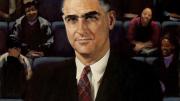In the spring of 1967, John U. Monro ’34 made national headlines—and befuddled Harvard colleagues—by resigning as dean of the College and moving to Miles, a cash-strapped, unaccredited, historically black college on the outskirts of Birmingham, Alabama.
The lifelong New Englander insisted that by going to Miles, where he would direct the freshman studies program and teach writing and social science, he was not making a sacrifice but accepting “a job of enormous reward.” Nevertheless, it was widely assumed that he was either assuaging a bad case of liberal guilt or gathering material for a book—and that either way, his stay would be brief. Then-divinity student Peter Gomes (later Harvard’s long-serving minister in Memorial Church), recalled that “nobody” on campus could understand Monro’s decision “since everyone believed that Harvard was…the only place the Holy Grail might be found, and that if it did happen to be elsewhere, it wasn’t in Alabama.” But Monro confounded the skeptics, moving South for good and teaching at historically black colleges for the final three decades of his professional life.
Doubters might have looked at his record, which demonstrated the same concern for diversity and social justice that eventually propelled him South. As a Harvard senior, he led an insurrection at the Crimson, persuading fellow staffers to help him publish a rival daily for almost six weeks. The quixotic undertaking took a heavy toll—only a leave of absence saved him from flunking out—but Monro paid the price willingly; the Harvard Journal promulgated more inclusive journalism, based on his belief that education imposed an obligation to participate in the world at large. Unlike the insular, all-male Crimson, the Journal chose to cover the entire university—it had a Radcliffe section with its own editorial board—as well as local, national, and international news.
As a student journalist, Monro had been part of something capable of significantly affecting society; from then on, he sought out endeavors with the same potential. He continued in journalism, at the Harvard News Office and as a freelancer, until September 1941, when he joined the navy. After the war, he joined Harvard’s Office of Veterans Affairs and helped implement the GI Bill. As early as 1948, he began traveling to recruit black undergraduates; when his own efforts bore little fruit, he joined the board of the new National Scholarship Service and Fund for Negro Students and persuaded Harvard to collaborate in finding and recruiting promising applicants. On campus he backed the creation and approval, in 1963, of the Association of African and Afro-American Students and defended it against objections that it fostered re-segregation, aided by Archie Epps, B.D. ’61, who became one of Harvard’s first black administrators when Monro made him an assistant dean.
Other disparities troubled Monro as well. Motivated in part by his years as a commuter at Phillips Andover, he helped Harvard’s undergraduate commuters move from the fringes of campus life and obtain their own House, Dudley. At Harvard and beyond, he protested the widespread practice of using financial aid to compete for the best students, having seen his own parents struggle to put three sons through college. After becoming director of financial aid in 1950, he devised a sophisticated formula for more precisely determining student needs; a simplified version, nicknamed “the Monro Doctrine,” was adopted by the College Board and is still used today. And as dean, he championed the newly created Peace Corps: heading its Harvard-based training program, enlisting faculty aid, conducting a one-man exploratory expedition to Nigeria—and handling damage control. When a volunteer’s poorly worded postcard set off an international furor, Monro defended both the volunteer and the corps, using the incident to emphasize why privileged students needed to learn firsthand “what it’s like to live in a country where half the babies are dead before they’re three.”
He met Lucius Pitts, the president of Miles, at a conference in 1962, and they formed a creative partnership, collaborating on a grade-school tutoring project that teamed volunteers from Phillips Brooks House with Miles students and sent them, in mixed-race teams of two, into Birmingham during the summer of 1964, just weeks after three civil-rights activists were murdered in Mississippi. Once he moved to Miles, he convinced a small army of graduate students and young teachers to come South, while arguing simultaneously that black colleges needed black leadership to fulfill their mission as bastions of black institutional strength.
He remained at Miles for a decade, then moved to Tougaloo, another historically black college, where he taught for almost 20 years more. When hearing and memory loss made classroom teaching impractical, he worked in the writing center, collaborating one-on-one with an endless stream of students. Only the symptoms of Alzheimer’s forced him to retire, with great reluctance, at 84. In his class’s twenty-fifth anniversary report, he hinted at the source of his remarkable endurance. “I see education at the heart of our democratic process,” he wrote, “sharing a large part of the task of assuring each young person the chance to develop his own talents and of awakening and strengthening each individual mind and spirit.”









